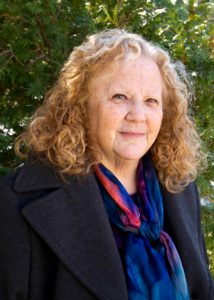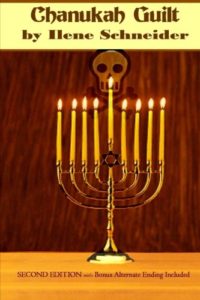 by Rabbi Ilene Schneider
by Rabbi Ilene Schneider
Am I a Jewish writer? Are my books Jewish books?
And what determines a Jewish book anyway?
I’m a rabbi. My protagonist is a rabbi. My Rabbi Aviva Cohen mysteries are Chanukah Guilt, Unleavened Dead, and Yom Killer. My work in progress is Killah Megillah. One of my nonfiction books is Talking Dirty—in Yiddish?
When I first tried to find an agent for Chanukah Guilt, an interested agent, Jewish, told me to change the title, no one outside of the two coasts would get the pun. A friend of mine, then an aspiring novelist, was advised by another agent to make her novels “less Jewish,” to take out the Yiddish words and make the characters more, for lack of better word, pareve. I think those two agents underestimated the extent of cultural literacy in the United States. I have yet to meet anyone who has not understood the pun in the title. I also doubt anyone told Michael Chabon to change the title or tone down the characters in The Yiddish Policemen’s Union.
But what makes a book a Jewish book?
Is any book by a Jewish writer, no matter the level of his or her commitment or observance, automatically a Jewish book? Faye Kellerman’s mysteries have Jewish protagonists, but those written by her husband and son do not. Are her books Jewish, but theirs aren’t? Is a book with a Jewish theme or protagonist or setting automatically a Jewish book even if the author is not a Member of the Tribe? Is Thomas Mann’s Joseph and His Brothers a Jewish book because it is essentially a midrash on the stories in Bereshit?
When we think about Jewish books, we think about literary fiction—Bernard Malamud, Chaim Potok, Philip Roth, Eli Wiesel, Primo Levi. We think of ponderous, serious books with philosophic themes that make us reflect. We do not think of a humorous cozy mystery featuring a woman rabbi with a sideline as an amateur sleuth in a small, fictional town on the edge of the South Jersey Pine Barrens.
 I sometimes wonder if the plots of my books could still be written in the same way if Rabbi Aviva Cohen were Father Sean Donohue or a college professor or a supermarket cashier, if the setting were a Puritan town in Vermont or in the Midwest. It might be difficult—after all, people don’t confide in a supermarket cashier the way they do in a rabbi—but yes, with modifications, the basic plots could be the same, even if there were no Jews among the characters.
I sometimes wonder if the plots of my books could still be written in the same way if Rabbi Aviva Cohen were Father Sean Donohue or a college professor or a supermarket cashier, if the setting were a Puritan town in Vermont or in the Midwest. It might be difficult—after all, people don’t confide in a supermarket cashier the way they do in a rabbi—but yes, with modifications, the basic plots could be the same, even if there were no Jews among the characters.
So what makes my books Jewish? It is the ambience, the gestalt: the settings, the activities the characters engage in, the words they use, the cadence of their dialogue. There is a certain ta’am, a kind of Jewish aesthetic that marks the books as Jewish, even if it is just the titles, the names, the synagogue, the Jewish rituals described. While it could be possible to use the same suspicious deaths at the heart of the books, the same motives, the same solutions, the books wouldn’t be the same without the details that make them uniquely Jewish.
Rabbi Ilene Schneider, Ed.D.,decided what she wants to be when she grows up: a writer. Despite spending her retirement (from earning a regular paycheck) birding, gardening, going to movies, traveling, and over-sharing on Facebook, she is the award-winning author of the Rabbi Aviva Cohen Mysteries, of Talking Dirty–In Yiddish?, Recipes by the Book: Oak Tree Authors Cook, and of short stories.
